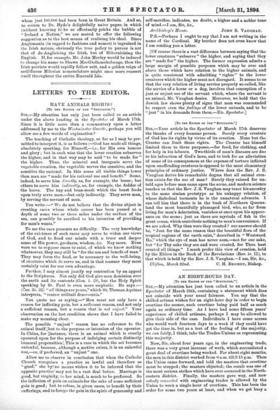LETTERS TO THE EDITOR.
HAVE ANIMALS RIGHTS ?
[To THE EDITOR OF THE "SPECTATOR."] SIR,—My attention has only just been called to an article under the above beading in the Spectator of March 17th. Since it is little more than a commentary upon a letter addressed by me to the Westminster Gazette, perhaps you will allow me a few words of explanation P The teaching of Catholic theology, so far as I may be per- mitted to interpret it, is as follows :—God has made all things, absolutely speaking, for Himself,—i.e., for His own honour and glory ; but in such wise that the lower creation subserves the higher, and in that way may be said " to be made for " the higher. Thus, the mineral and inorganic serve the vegetable creation, the vegetable serves the sensitive, and the sensitive the rational. In this sense all visible things lower than man are "made for his rational use and benefit." Some, indeed, to serve him directly, as, for example, the horse ; but others to serve him indirectly, as, for example, the fodder of the horse. The hay and bran-mash which the beast feeds upon truly serve man,—but only indirectly. They serve man, by serving the servant of man.
You write :—" We do not believe that the divine object in creating races whose whole career has been passed at a depth of some two or three miles under the surface of the sea, can possibly be ascribed to his intention of providing for man's wants."
To me the case presents no difficulty. The very knowledge of the existence of such races may serve to widen our views of God, and to flood our minds with a truer and deeper sense of His power, goodness, wisdom, &c. Nay more. Even were we to suppose races to exist, of which we know nothing whatsoever, they may still be "for the use and benefit of man." They may form the food, or be necessary to the well-being, of creatures which do serve us, and in that manner they most certainly exist for our own advantage.
Further, I may almost justify my contention by an appeal to the Scriptures. Not only did God give man dominion over the earth and its contents (Gen. i. 28), but the Holy Spirit speaking by St. Paul is even more emphatic. He says :— (Cor. iii. 22) " all things are yours," which St. Thomas Aquinas interprets, " vestrce utilitati deserventia."
You quote me as saying,—"Men must not only have a reason for inflicting pain, but a sufficient reason, and not only a sufficient reason, but a reason that is not unjust." Your observation on the last condition shows that I have failed to make my meaning clear.
The possible " unjust " reason has no reference to the animal itself but to the purpose or intention of the operator. In China, for ;instance, there is an animal which is cruelly operated upon for the purpose of indulging certain distinctly immoral propensities?;. This is a case in which the act becomes unlawful, because, although a motive exists, it is an unlawful One,—or, if preferred, an " unjust " one.
Allow me to observe in conclusion that when the Catholic Church recognises a practice as lawful and therefore as good," she by no means wishes it to be inferred that the opposite practice' may not be a vast deal better. Marriage is good, but virginity, to her mind, is much to be preferred. So the infliction of pain on animals for the sake of some sufficient gain is good; but to refuse, in given cases, to benefit by their sufferings, and to forego the gain in the spirit of generosity and self-sacrifice, indicates, no doubt, a higher and a nobler tone: of mind.—I am, Sir, &c., P.S.—Perhaps I ought to say that I am not writing in the- name of the Cardinal. My brother does not even know that. I am sending you a letter.
[Of course there is a vast difference between saying that the- lower creatures " subserve " the higher, and saying that they are " made for" the higher. The former expression admits a large margin of possible purposes which may be over and above those which have relation to the higher animals, and is quite consistent with admitting "rights" to the lower creatures which the higher must not disregard. It seems to no that the very relation of living service properly so-called, like- the service of a horse or a dog, involves that conception of a just or unjust use of the servant which, where the servant is an animal, Mr. Vaughan denies. Moreover, we hold that the Jewish law shows plenty of signs that man was commanded to respect even the feelings of the lower animals, and to be " just " in his demands from them.—ED. Spectator.]


































 Previous page
Previous page